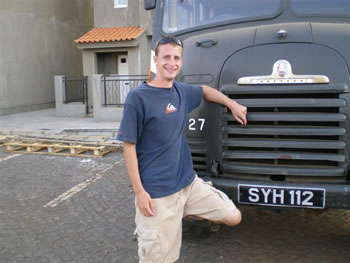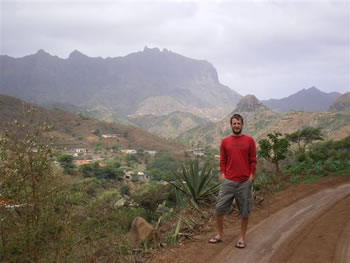Catching up with Scott Jeno
 Scott Jeno is almost as far away from his alma mater as a person can get. A member of Huntington High School’s Class of 2002, he is in the midst of 27 months of volunteer service with the Peace Corps. He’s living and working in the Cape Verde Islands, located 310 miles off the west coast of Africa in the Atlantic Ocean.
Scott Jeno is almost as far away from his alma mater as a person can get. A member of Huntington High School’s Class of 2002, he is in the midst of 27 months of volunteer service with the Peace Corps. He’s living and working in the Cape Verde Islands, located 310 miles off the west coast of Africa in the Atlantic Ocean.
Mr. Jeno was a member of Huntington’s National Honor Society chapter and played on the JV soccer and varsity baseball and golf teams. He went on to earn an undergraduate degree at C.W. Post College in history education in 2006. At LIU he qualified for the freshman social studies and the Phi Eta honor societies.
Following graduation, Mr. Jeno was a substitute social studies teacher in the South Huntington school district. But, he soon heard another calling.
Mr. Jeno’s joining the Peace Corps isn’t as surprising as it might seem. As a teenager and later as a college student, he traveled to the Red Bird Mission and Henderson Settlement in Kentucky four different times with the United Methodist Church to renovate homes for the underprivileged.
While deciding whether or not to join the Peace Corps, Mr. Jeno sought information and advice from Tom Smith, who was one of his science teachers in both middle school and high school. Mr. Smith is also a former Peace Corps volunteer.
Mr. Jeno left the United States in June 2007 and following two months of training, during which he learned to speak Portuguese and Kriolu, the Huntington alum was sworn in as a Peace Corps volunteer on September 1.
 Mr. Jeno has been teaching seventh and eighth graders English in the village of Sao Francisco in the Cape Verde Islands. The Peace Corps built him a small concrete house since it’s the first time it has ever had one of its volunteers in this particular village. He also teaches adults from Sambala village six nights a week. That village is a developing resort area and he serves as a link between the village and the community.
Mr. Jeno has been teaching seventh and eighth graders English in the village of Sao Francisco in the Cape Verde Islands. The Peace Corps built him a small concrete house since it’s the first time it has ever had one of its volunteers in this particular village. He also teaches adults from Sambala village six nights a week. That village is a developing resort area and he serves as a link between the village and the community.
Last Thanksgiving, Mr. Jeno was invited to the U.S. Embassy where he rubbed elbows with ambassadors from a variety of countries and other Foreign Service officials. He is scheduled to assist with the next group of Peace Corps volunteers coming this year. He has also hosted Rhode Island U.S. Congressman Patrick Kennedy, who came to the country on a fact-finding mission with a pair of fellow members of the House of Representatives.
Life off the coast of Africa is much different than suburban Huntington. One day Mr. Jeno walked down to the beach and came upon one of his neighbors, who was looking for his cattle in order to herd them back to his house. “So I helped him look for the cows and we found them in about 45 minutes,” he said. “Then we herded them all the way back home. We talked about cows the whole way. This was a kid in high school who seemed so passionate about the cows and the business. He told me each cow’s story, what they do with the cows, and all about the business and caring for the cows. I learned so much and it felt pretty awesome because I learned from a high school kid in another language as opposed to maybe some field trip you would take to a local farm in elementary school. I think the kid enjoyed teaching me also and we had fun herding them.”
Mr. Jeno is full of interesting stories from his time spend in the Cape Verde Islands. “The night I got back from training I went to a neighboring town (Vale Da Custa) for a party,” he said. “This town has nothing; no water, no electricity. This is the town that Sambala is going to move and supply them with new houses, water, and all the works. Anyway, I came across one of my students from my night classes. It was actually his 21st birthday. He brought me to his house, which is just one room with two beds and rock walls. He wanted to show me his three new puppies. They were only 18 days old. He wanted me to name them and I said that he should name them after something in English. So he named one Merka (America), one Teacher, and the other Scott. So that was kind of cool.”
Cape Verde came off the list of underdeveloped countries on January 1 and moved into the “middle developed” group of nations. “This is pretty exciting but also a little scary,” Mr. Jeno said. “Basically all that means is that they lose certain foreign aid and I hope that this country is really ready for that. So it’s kind of exciting to be here now because I am actually seeing a developing country actually develop. I am living here and I can get excited when they open an international airport and build a road to the airport that bypasses the capital, or open a mini-market in my small little town, or light the streets of my town with street lights, and bring internet to that town, or see an entire country become the fastest growing tourist spot in the world and how all that is being managed.”
Peace Corps volunteers do not all have the same type of experiences. “This is what makes Peace Corps so fascinating, because there are volunteers who live in huts on the mainland of Africa and have a completely different experience and see development from a different perspective, and may not even see much actual development in large scales,” Mr. Jeno said. “Then there are volunteers who live in some urban metropolis in Eastern Europe who may see and live in the development of information technology, and other volunteers of other countries who are dealing with a volatile tourist industry, or AIDS epidemic, or a country that is trying to improve women’s lives, or a national park that is trying its hardest to conserve its resources. I was plopped where I am and I have no regrets.”
Mr. Jeno’s parents, Jan and Wayne, hope to visit him this coming August. It will be a special trip, indeed. He can be contacted at sjeno84@hotmail.com.
All graphics, photographs, and text appearing on the Huntington Public Schools home page and subsequent official web pages are protected by copyright. Redistribution or commercial use is prohibited without express written permission. Comments or Questions? email the Public Information Office